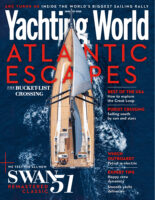The choking emotion of leaving loved ones sums up the privations and real risks these solo sailors face
Nothing gives you a more visceral sensation of what the Vendée Globe means to sailors and what it takes to do this race than the leaving.
Despite every advance of technology and all the instant communications available they are disappearing into a lonely and hostile world with a small but very real risk they might not come back.
This is why the atmosphere as the yachts leave the dock and the skippers say goodbye to wives and children is so thick with emotion. There is no other race that I can think of like it where the parting is so wrenching to watch. It catches everyone, however hardened.
I’ve seen the departure of four Vendée Globe races so I know to bring waterproof mascara and sunglasses.
For me, seeing Mike Golding off is an important moment, part of a personal Vendée tradition. Mike’s been trying to win this race for 16 years and his trials are a substantial part its tapestry.
Goldfinger, as the French call him (obtusely, because he’s hugely respected for his integrity, strength and tenacity), has become well practised at saying his goodbyes to his wife, Andrea, and 9-year-old son Soren, pictured above.
He had a few quiet words for his son, cracked a couple of jokes to keep the atmosphere jolly, but privately admits that it gets harder and harder to leave each time. His wife, whom he met 17 years ago when she was one of the paying crew on his BT Global Challenge boat Group 4, knows the routine so well.
Andrea was in tears. Photographers and cameramen homed in. It’s a ruthless sport.
It’s hard to speak of the risks involved in this race, but they are somewhere at the back of everyone’s mind. Historically, the retirement rate is 50%, and each DNF is a major, dream-crushing drama of one kind or another.
Four years ago, two of these could so easily have been fatal: Jean Le Cam’s capsize near Cape Horn; and Yann Elies’s femur fracture on the bowsprit of his boat deep in the Southern Ocean.
So there is a feeling of moving on to a war footing, an acknowledgement of the many hardships and difficulties each one of these sailors will face in the next few months.
The first few days are tough for most sailors. It takes time to settle in. Some can suffer from seasickness (Golding is one) and need to find their sealegs. This coincides with a beat out of Biscay on a building breeze.
After this a front will free them and there will be a race to try to get to Cape Finisterre ahead of the formation of a ridge of high pressure with lighter winds. This could well be the first gate for the fleet.
For those who can get south of this ridge at Cape Finisterre there are forecast to be winds at of 30-35 knots and 5m seas with fast running conditions. The pressure is on right from the start.




